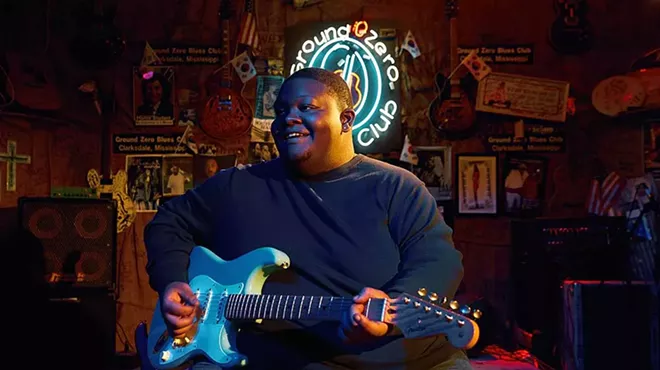The Aretha Franklin Amphitheatre celebrates four decades of concerts
40 seasons of sound


Audio By Carbonatix
[
{
"name": "GPT - Leaderboard - Inline - Content",
"component": "35519556",
"insertPoint": "5th",
"startingPoint": "3",
"requiredCountToDisplay": "3",
"maxInsertions": 100,
"adList": [
{
"adPreset": "LeaderboardInline"
}
]
}
]
In the 1980s, Detroit mayor Coleman A. Young decided he wanted to establish an outdoor amphitheater on Detroit’s riverfront. He wanted something that city residents could enjoy, and hoped it could rival the Pine Knob amphitheater in suburban Clarkston.
“You know, the pitch was to create more access to the river for the citizens,” says Shahida Mausi, who was the executive director of the City of Detroit Council of the Arts at the time. “And so it began with three linked riverfront parks, and Chene Park was one of those.”
Now known as Aretha Franklin Amphitheatre, Chene Park launched in 1985. Mausi produced and scheduled its inaugural Wednesday night series, with tickets priced around $5. She admits she and Mayor Young really didn’t know what to expect.
“One of those first concerts was with a woman by the name of Carmen McRae,” Mausi says. McRare was a highly regarded jazz singer, but the performance was stalled that afternoon by some stubborn Detroit rain showers. Surprisingly, the crowd waited for the rain to pass and eventually McRae was able to take the stage.
“Six thousand people came with umbrellas and whatnot and sat on the wet grass and waited to see her,” Mausi says.
“When the rain stopped, we pulled the piano out and she did a fabulous concert,’” Mausi adds. “And at that point, the mayor said, ‘Well, maybe we’ve got something here, let’s build it out.’”
Seats were installed, and the park went on to be expanded three different times. (Due to logistics and architectural limitations, it was impossible for it to be built out to the size of Pine Knob, which holds 15,000.) Mausi oversaw programming for the first three years, and over the next two decades Chene Park began to host regular concerts every summer — including jazz, R&B, techno, hip-hop, rock, and more.
In 2004, Mausi’s company the Right Productions won a bid to be the governing body over all the programming at Chene Park. The opportunity was important to her, she says, as she was there since the beginning.
“You know, it’s a special place,” she says. “It’s a beautiful place. So when the opportunity arose to bid as a for-profit company to manage and operate it, that’s something that I just really wanted to do.”
The Right Productions has always been a family effort, as Mausi’s sons Sulaiman, Malik, Rashid, Dorian, as well as her former husband Sundiata, have all played intricate roles in production, marketing, and maintenance over the years. The family structure has helped them survive the tough times such as the 2008-2009 recession and most recently the 2020 pandemic.

“It was more than just a job, you know,” says Dorian, who started working there as a teenager. “It’s not a paycheck, it’s a family business. And so that gives you an extra added push [to] stick with it, if you will, to help push it through.”
Chene Park has hosted its share of memorable nights over the past 40 years, including performances by the Roots, Erykah Badu, and the White Stripes, but Mausi says it would be hard to top its 30th anniversary celebration held on August 21, 2015. The show featured Ron Isley and was highlighted by a spectacular set by Detroit’s own Queen of Soul, Aretha Franklin.
“Her performance was special,” Mausi says. “She played well beyond curfew into the night and her band members commented on the fact that this was not an ordinary show.”
Franklin passed away three years later, almost to the date, on August 16, 2018 at age 76. Chene Park hosted a wake the day before the funeral that was attended by entertainment and political heavyweights including Tyler Perry, Jennifer Hudson, Maxine Waters, Jesse Jackson, and Louis Farrakhan. The next day at the funeral, Mayor Mike Duggan announced Chene Park was going to be renamed The Aretha Franklin Amphitheatre, now affectionately referred to as “The Aretha.” Mausi didn’t know the announcement was coming, but was honored to bring the name change to fruition.
“The shouldering of that responsibility, to carry that name, that mantle, is significant,” Mausi says. “[Aretha Franklin] deserved and deserves tremendous respect.”

Although Mausi is proud of the hundreds of concerts her family has brought to the residents of Detroit, she’s just as proud of the stable employment she’s provided by hiring up to 300 workers each summer. The Right Productions is also the biggest African American-owned production company that operates a 6,000-capacity theater. In recent years some of Detroit’s primary live entertainment venues have gone corporate: Live Nation Entertainment owns both Saint Andrew’s Hall and the Fillmore, while AEG Presents have an exclusive operating and booking agreement for the Masonic Temple’s venues. This has made things more competitive, but Mausi is never one to complain or back down.
“It’s hard, and yet we persevere,” she says. “And I’m on the board of the National Independent Venues Association, because it’s important that we maintain venues that are independent, that are not under corporate controlling guidelines. It gives us more latitude in a lot of ways, more freedom.”
Moving forward, the Aretha plans to implement more rock and country concerts along with the usual programming of R&B, jazz, and hip-hop Detroiters are used to. On May 23, The Aretha will kick off its 40th season with singer October London. “He’s putting on a little of our Detroit tradition,” she says of the Indiana-born crooner.
Other big acts coming through include Grammy-winning jazz wunderkind Samara Joy on June 4, country singer Jamey Johnson on June 13, and an “I Love the ’80s” concert with A Flock of Seagulls and Bow Wow Wow, among others.
Overall, it’s hard to imagine the last 40 years of Detroit’s live entertainment scene without the contributions of the Mausi family. The Aretha has sewn itself within the fabric of Detroit music and nightlife.
“We are humbled and honored to produce something that means so much to so many people,” Mausi says. “When we open the box office, and people spend the night because they want to be the first in line — that means they trust us to bring a quality product. And that’s awesome.”









